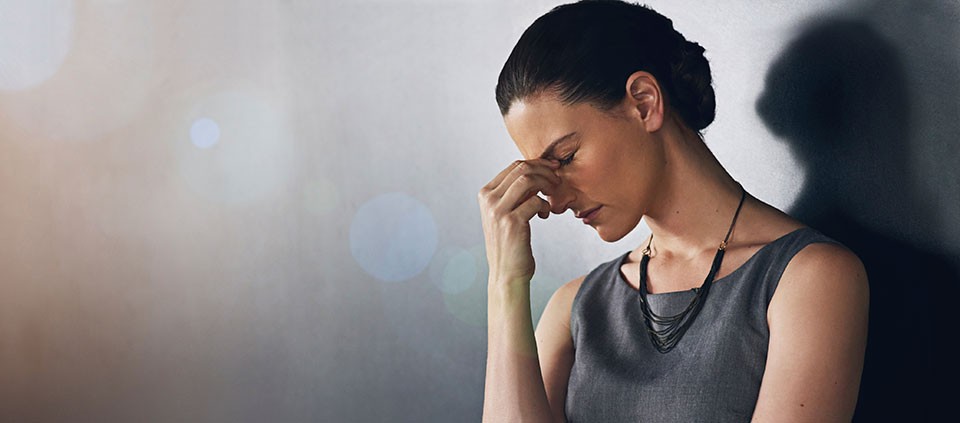The Ow of Now: Can Pain Be a Doorway to the Present Moment?

My first yoga teacher used to say, “Don’t think of it as pain, think of it as sensation.” I was always thinking “yes, painful sensation.” Over time, of course, I learned to diminish the painful sensation not just by thinking about it differently but also with both breathing and alignment. And when all that didn’t work, I learned to put my Type-A ego aside and back off the pose. Back away from the chaos. Being a clever yogi, I then attempted to export these techniques from my mat into my life.
But right now in my life, sometimes no matter how much I want to, I just can’t seem to back away from the pain. And I know it’s not just me. Of course, we’re in a transition of some kind—between ages, paradigms, even dimensions—and as I’ve learned in my yoga practice, the transition between poses is where most injuries—aka pain!—happen.
So how to deal with the pain? I know sometimes it’s best to surrender. But who wants to? Unless by “surrender” you mean nap. Which I am always happy to do. (And maybe not coincidentally, “I nap” does happen to be an anagram for pain.)
A few months ago, my friend Harland noticed I couldn’t, or at least didn’t, walk on stage without that one complimentary Campari the club would begrudgingly serve me. I was defensive. After all, I wasn’t doing the Hollywood-style bottoming out from drugs and alcohol you see on magazine covers. He said, “Honey, you’re not a Sloppy Drunk, but you are a Little Lush.”
At first it sounded kind of sweet. A Little Lush. Like a tiny tropical garden. But that was just me avoiding the fact that I was avoiding the pain. I was drinking every day, just enough to take the edge off. Let’s face it, there’s a lot of edge to take off right now. There’s so much “ow” in this now. I was drinking to not feel it. And I started to wonder why.
I tend not to want to dredge up the past. But I began thinking about when I was five and was hospitalized for a blood disease that was initially diagnosed as leukemia. There were spinal taps and daily blood tests. The doctor was always telling me: “It’s not going to hurt.” Maybe I misunderstood his accent, because guess what? It did hurt. And I suppose I got the idea that hurting was something so profoundly bad that it couldn’t even be acknowledged. That pain was worse than lying.
I told my mother I had stopped drinking. “Do you think now, with everything going on,” referring to some issues with my house and my career, “that this is the best time for you to stop drinking?” she asked.Which made me laugh.
Because now is the best time. It’s the only time. The first sutra says: now is the time we do yoga. Because whenever we do yoga we are in the now. And not drinking has put me more in the now, even, and especially, when the now is incredibly painful. I couldn’t help but wonder: was sobriety a kind of yoga?
Larry Dosey, in his book Space, Time and Medicine, explains that pain contracts time, and painkillers (analgesics) expand time—not to mention your waistline. Painkillers really bloat you, the prescription kind and even the second-bowl-of-ice-cream kind that you sometimes need to make the pain go away.
I started to think that maybe the pain we’re in as a culture comes from a sense of life contracting. And that the more we can do to expand time, by laughing, singing, crying, practicing, loving, connecting with friends in real life, not just online—which is really just a shortcut to being more detached, contracted—the less pain we are in.
I am following the path I lay out in my show 100% Happy 88% of the Time. Rather than bury the pain in some dark hollow inside my body, I let myself be unhappy, aka in pain, 12 percent of the time. I try to not be “fine.” I try not to be in unacknowledged pain. Because I’ve noticed that it is not possible to convert the painful 12 percent of life experiences into total joy. But fine is something you get stuck in. It’s a flatline. In fact, “fine” is actually a contraction of “flatline.” F’ine. A contraction of a state of contraction.
But of course, each time you make the conversion from fine to unhappy and ultimately to happy, you have to change. But change makes us unhappy, because we tend to cling, and change means letting go. But we have to change to be happy, because life is change. So the truth is you have to be unhappy to be happy. It’s so simple. Painful, but simple.
© Kripalu Center for Yoga & Health. All rights reserved. To request permission to reprint, please e-mail editor@kripalu.org.
Beth Lapides is an entertainer, producer, author, and host. She has taught extensively in theaters, universities, clubs, cultural institutions, and at...
Full Bio and Programs